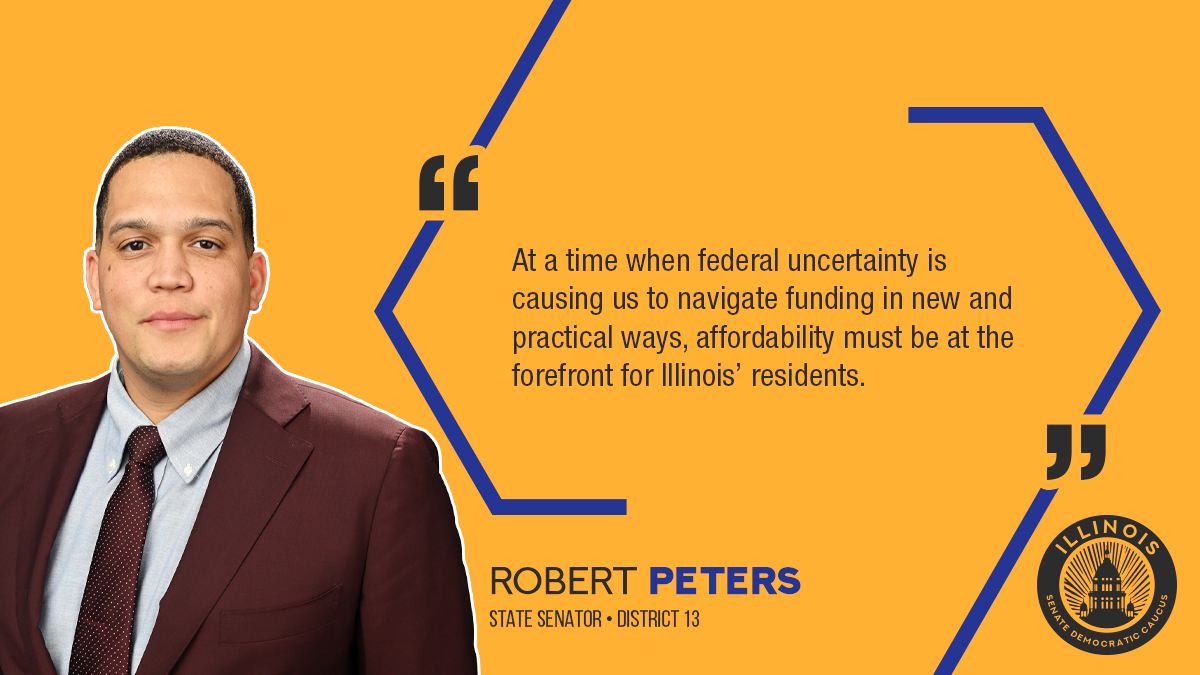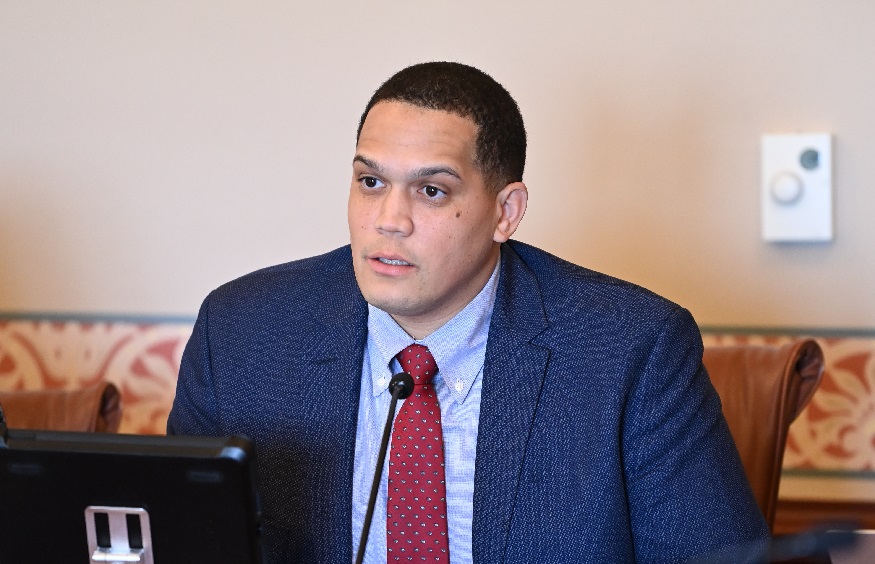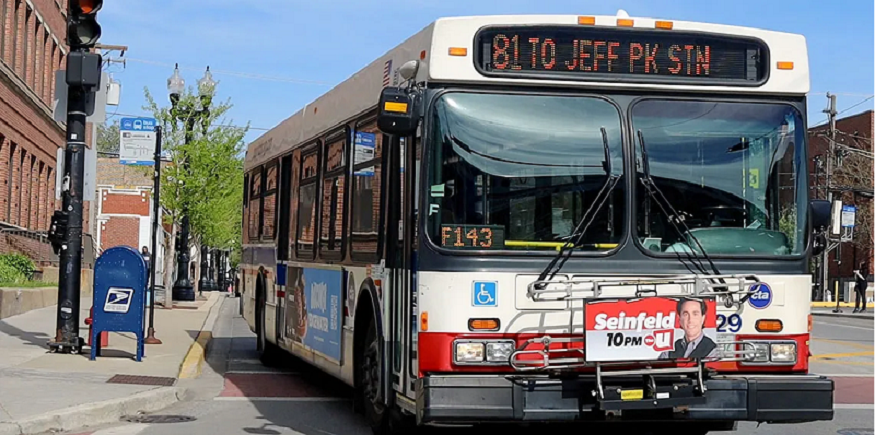Peters: Affordability must be at the forefront for Illinois’ residents
- Details
- Category: Press Releases
 SPRINGFIELD — After Governor JB Pritzker delivered the State of the State address, including his Fiscal Year 2027 budget proposal, on Wednesday, State Senator Robert Peters (D-Chicago) released the following statement:
SPRINGFIELD — After Governor JB Pritzker delivered the State of the State address, including his Fiscal Year 2027 budget proposal, on Wednesday, State Senator Robert Peters (D-Chicago) released the following statement:
“Across the nation, we’re seeing attempts from the Trump administration to stall federal funding for critical services and essential infrastructure, including emergency grants, transportation aid, investments in safety-net hospitals and more.
“At a time when federal uncertainty is causing us to navigate funding in new and practical ways, affordability must be at the forefront for Illinois’ residents. As our neighbors face fears regarding the rising cost of living, I remain committed to advocating for investments that prioritize the stability of our state’s workers, families and students – from heightening labor protections to fully-equipping after-school and violence prevention programs.”
Peters introduces measure to protect consumers, workers from AI-driven discrimination
- Details
- Category: Press Releases
 SPRINGFIELD — Artificial intelligence has been a source of consumers’ data and privacy concerns for over a decade, but in recent years, a new branch has started to stem from these concerns, as reports indicate stores may be using AI-gathered personal data to charge customers more for goods and services. To protect Illinoisans from this practice – known as surveillance-based discrimination – State Senator Robert Peters has introduced legislation that would block the use of modern technology to set personalized prices or wages.
SPRINGFIELD — Artificial intelligence has been a source of consumers’ data and privacy concerns for over a decade, but in recent years, a new branch has started to stem from these concerns, as reports indicate stores may be using AI-gathered personal data to charge customers more for goods and services. To protect Illinoisans from this practice – known as surveillance-based discrimination – State Senator Robert Peters has introduced legislation that would block the use of modern technology to set personalized prices or wages.
“The Surveillance-Based Price and Wage Discrimination Act is commonsense legislation that would protect our residents from price gouging, wage discrimination and data privacy threats,” said Peters (D-Chicago). “At a time when corporations are prioritizing profits and shareholder wealth over consumer affordability and worker pay, this measure would secure the finances, data privacy and equality of all Illinoisans.”
Surveillance pricing and wage data includes personal information such as browsing history or behavioral patterns, and companies typically collect and analyze the data using AI and algorithms to charge personal prices for customers or set personal wage rates for gig workers – like Uber drivers. Peters’ measure aims to limit the use of surveillance data in the state, preventing companies from prioritizing maximum profits at the expense of individual privacy and dignity.
Peters announces $600,000 for Northerly Island park development efforts
- Details
- Category: Press Releases
 CHICAGO — Thanks to strong support from State Senator Robert Peters, the Chicago Park District received $600,000 from the Open Space Land Acquisition and Development grant for Northerly Island Park.
CHICAGO — Thanks to strong support from State Senator Robert Peters, the Chicago Park District received $600,000 from the Open Space Land Acquisition and Development grant for Northerly Island Park.
“This program has been essential for bridging equity gaps in community green spaces, providing critical funding for safe and equitable outdoor areas in neighborhoods that have, historically, been underserved,” said Peters (D-Chicago). “OSLAD grants help directly combat disparities in health, public safety and climate change that disproportionately affect the Black and brown communities in our state.”
OSLAD – one of the most popular grant programs in Illinois – is a cost-sharing program between state and local governments that helps communities fund land acquisition and development for parks and outdoor recreation projects. Since its establishment, OSLAD has awarded $675 million for park projects throughout Illinois.
Illinois’ transit reform signed into law with support from Peters
- Details
- Category: Press Releases
 SPRINGFIELD — A measure aimed at addressing issues facing the current public transit system in Illinois has been signed by the governor, thanks to support from State Senator Robert Peters.
SPRINGFIELD — A measure aimed at addressing issues facing the current public transit system in Illinois has been signed by the governor, thanks to support from State Senator Robert Peters.
“Having a reliable public transit system is a genuine need, not just for our communities but for every state in the U.S.,” said Peters (D-Chicago). “Reliable public transit connects people to businesses, essential services and opportunities. With this new law, we’re not only avoiding crisis, we’re making a long-term reform in the system that keeps our region moving.”
Senate Bill 2111 will create the Northern Illinois Transit Authority, replacing the Regional Transportation Authority. The NITA board will comprise of 20 members, with five appointments each from the governor, mayor of Chicago and Cook County Board president, as well as one from each chair or county executive of the collar county boards of DuPage, Kane, McHenry, Lake and Will.
More Articles …
Page 1 of 96





